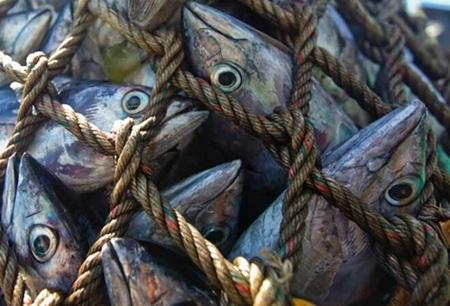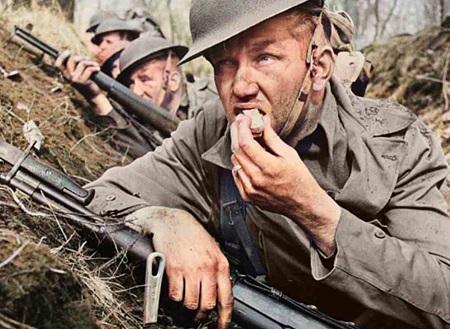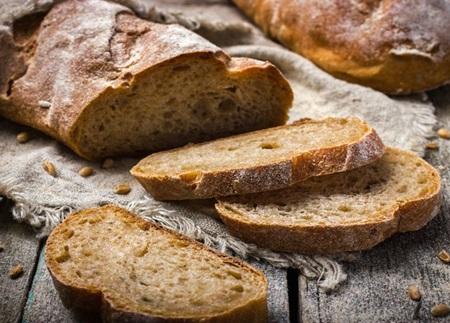Prayer – Confession of Dependence
Prayer – Confession of Dependence

What ought strong, healthy, competent men to say to God? The disciples around Jesus weren't so sure. Hence their request: "Lord, teach us to pray." Jesus' answer included more than instruction about Who the God was to whom one prayed. It also included more than instruction to pray that God's name be hallowed, that His kingdom be made to come, that His will be done. Jesus told the twelve disciples standing around Him to pray also for daily bread.
Amazing⤒🔗
Each of the twelve standing around Jesus were mature, healthy men, all quite able to look after himself. There was a Levi, also known as Matthew; he was a tax collector by trade, a hard-dealing business man well able to extract from another what the other owed in taxes. Even if we assume he was an honest man in his tax-collecting, we still need to perceive the man as shrewd and self-sufficient. Among the disciples were also a number of fishermen, rough, tough characters who didn't mind the storms at sea, who didn't mind either getting their hands dirty with fish scales and insides. Of Peter and Andrew we read that they had their own boat, and of James and John we read that they worked with their father Zebedee in the family business. There's no doubt: these men were tradesmen, they knew the craft of fishing. In a word: they were men, self-sufficient, able to look after themselves, able to stand on their own two feet in the world.
These men asked Jesus to teach them to pray; they wanted some guidance in how to speak with God in heaven. Jesus (we may imagine) looked the twelve in the eye, and told them all – no matter how big and strong they felt – to ask for "daily bread.” Said Jesus to the twelve: you want to know what to say to God in heaven? Speak with Him, said Jesus, about tomorrow morning's breakfast. More: ask God to give you breakfast tomorrow morning.
We understand: this is a rather amazing instruction. The twelve want to know how to pray. Jesus' answer seems to forget totally that these are mature men, each quite able to look after the self. Need they ask for daily bread?! It strikes us as humiliating. Surely, independent, self-sufficient men should be quite able, thank you, to look after themselves!
Dependent←⤒🔗
It is basic to prayer to know oneself dependent on the Lord God. Foundational to prayer, foundational to any relation with God, is the notion that God is God and we but creatures, the notion that we cannot live without His giving to us life and breath itself, cannot live without His giving to us food and drink, clothes and shelter, yes, all the things we need for body and soul. The person who wishes to be independent and self-sufficient will invariably have trouble praying because he has the wrong attitude toward God, and the wrong attitude concerning himself also. The disciples asked for guidance in praying. Jesus impressed upon them: to pray you need to know and acknowledge your dependence. You may be big men, strong men, healthy men, experts in your trade, but – says Jesus – you are and remain dependent on the Lord God for tomorrow's breakfast. Says Jesus: unless God in heaven give you your daily ration, you will hunger tomorrow, you'll have nothing to eat.
Revealed in Scripture←⤒🔗
By so saying, Jesus very much built on God's revelation to His people in the Old Testament. In Genesis 2 we read the following:
Then the LORD God took the man and put him in the garden of Eden to tend and keep it. And the LORD God commanded the man, saying, 'Of every tree of the garden you may freely eat'.Genesis 2:15f

From the beginning God made it clear to Adam (and so to all his descendents over the centuries) that Adam was not self-sufficient, not dependent on his own resources. It was God who placed him in the garden, and straightaway gave him his evening meal; Adam could help himself to any tree of the garden God graciously gave.
The people of Israel in the desert were taught the same lesson. Morning after morning breakfast was laying on the ground for the people; they needed but step outside their tents, gather into a bucket what they needed, cook it up and sit down to eat (Exodus 16). For forty long years the Lord impressed upon the people their dependence on Him; each morning He showed His own that they were not self-reliant, were not to trust their own ingenuity in supplying daily bread for the family.
So it was that the Psalmist could Confess this:←↰⤒🔗
These all Wait for You,
That You may give them their food in due season.
What You give them they gather in;
You open Your hand, they are filled with good Psalm 104:27ff
And Again:←↰⤒🔗
Who gives food to all flesh,
For His mercy endures foreverPsalm 136:25
And once more:←↰⤒🔗
The eyes of all look expectantly to You,
And You give them their food in due season.
You open Your hand
And satisfy the desire of every living thingPsalm 145:15
There is no doubt about the instruction of the OT: all creatures, including that crown of God's creation known as Mankind, are dependent on their Creator. One may feel so big and strong, may be publicly considered a very gifted man in his field of expertise, but the teaching of Scripture is clear: all are thoroughly dependent on the Lord God for "life, breath, and all things" (Acts 17:25).
Real Life Example←⤒🔗
In fact, this dependence had been concretely driving home to the fishermen amongst the disciples by events they'd experienced a number of weeks before they requested Jesus to teach them to pray (Luke 11). Some of the disciples had been fishing all night and caught nothing – how frustrating for tradesmen. But Jesus told them to cast the nets anyway..., and see: "they caught a great number of fish," so many that "their net was breaking" (Luke 5:6). Talk about dependent! So those tough fishermen standing before Jesus as He spoke about prayer should get on their knees and ask God for tomorrow's breakfast. Though so strong and so able, they should not think in terms of being self-sufficient; though so strong and able they ought to know themselves to be but people, dependent, humble.
 ←⤒🔗
←⤒🔗
But a Man←⤒🔗
That is the attitude, my dear reader, that makes prayer possible. Without a sense of dependence on the Lord, you cannot pour out your heart before God and implore Him for His blessings in your circumstances. In order to pray, you need to acknowledge not that you're a man, a somebody; to pray you need to acknowledge that you are but a man, a creature dependent on your Creator and Redeemer.
Here, then, the whole notion of our creatureness needs to be clearly in our focus and so does the whole notion of our sinfulness. The measure of being a man is not that one is independent; that's arrogance, pride. The measure of being a man is that one acknowledges his place under the Creator, acknowledges also that this Creator – though rejected by us in Paradise – has again become our Father through Jesus Christ, and it is He and He alone who supplies for all our daily needs. Dependence! In the words of the Catechism:
Grant "that we may acknowledge that Thou art the only fountain of all good, and that our care and labour, and also Thy gifts, cannot do us any good without Thy blessing. Grant, therefore, that we may withdraw our trust from all creatures (ourselves included!), and place it only in Thee" (Lord's Day 50).
Those big and strong tradesmen standing before Jesus are to pray for daily bread. We understand that this instruction pertained not just to the crust one may have for lunch.
Implicit in Jesus' instruction to the disciples to pray for daily bread is also instruction to pray for the cheese you put on the bread, and the drink you consume with the bread; yes, it's instruction to pray for food in general, to pray for drink and clothes and shelter and sleep and daily work and strength to do the work, etc. Here is instruction to ask God for "all our bodily needs.”
Should the twelve, however, ask God for any item that struck their fancy? Should they ask for steak for their daily tea?
Should the fishermen in their midst ask for a new boat because, well, the neighbour has one too?
Structure←⤒🔗
To answer the question, we need to appreciate the structure of the Lord's Prayer. We tend to see the six petitions of the Lord's Prayer as made up of two parts.
The first three each speak of 'your' – Hallowed be Your name, Your kingdom come, Your will be done.
and the last three each speak of 'us' – Give us day by day our daily bread, Forgive us our debts, Lead us not into temptation.
This observation prompts us to conclude – mistakenly! – that God is central to the first three petitions, while in last three we get to pray for ourselves.
It is certainly, true that with the first three petitions we pray with God central to our minds and prayers. But it is not true that with the second set of three petitions we now get a chance to focus on our needs and wants without regard anymore to God. Once we get to the second set of three petitions, we are not to consider our God-centredness finished (as in: 'we've asked enough for God; now it's our turn'); with the second set of three petitions God remains the centre, the focus of our praying. The theme of that first petition – "Hallowed be Your name" – sets the tone for all prayer, including when we pray the fourth petition, when we ask for daily bread. Even a prayer for daily bread is to be God-centred.
To appreciate how this petition is meant to be God-centred, we need to understand the connections between the six petitions of the Lord's Prayer. The first petition sets the tone for all prayer: "hallowed be Your name" – God-centred. The second petition set the context in which we pray: "Your kingdom come" – life is war. In that context of war, now, we glorify God's name by doing the will of God, obeying His laws. Hence the third petition: "Your will be done." These three belong together.

But; how can one do the will of God? We all understand: we are not able to do the will of God if the God upon whom we are dependent does not supply us with daily needs. No soldier in battle can carry out the commands of his general successfully if that soldier's stomach remains empty and his store of ammunition depleted. To carry out his general's wishes, that soldier needs his 'daily bread'.
The Lord God would have His people, redeemed as they are in the blood of Christ, to glorify Him. They do so in a context of war, of satanic hatred. To be able to glorify God in the context of battle, temptation, hatred, strife, God's people are to obey His commands. To live obediently for God, God's people need strength from God, need daily bread and drink, need sleep, clothes, a vehicle, etc. The point is this: the fourth petition interlocks neatly with the first three; this fourth petition concerning daily bread also has God as its focus.
This connection between daily bread and God's glory is nothing new. In His Sermon on the Mount Jesus spoke of such basics of human existence as food, drink and clothes. But, Jesus taught His disciples in that sermon, do not worry about these basics. That is: don't focus your attention on them. What then? If the disciples were not to burn up their energies and their efforts in pursuit of their own needs, what was to burn them up? Jesus' answer was this:
But seek first the kingdom of God and His righteousness, and all these things shall be added to you.Matthew 6:33
Here is the same thought as I'm here developing: we are to be God-centred in all our activities, thoughts, and prayers, and God Himself will supply whatever we need.
God-Centred←⤒🔗
Our petitions for all our bodily needs, then, are to be focused on God's glory. If the apostle Paul can say that our eating and our drinking, yes, all of our activities, are to be done to the glory of God (I Corinthians 10:31), then it's evident that also our asking for food and drink is to be done to the glory of God. Just as I am not here for myself but instead for God, so too I am not to ask for myself but for God's glory. My petitions for daily bread are then to be prayed with God's glory central to my mind.
Satisfied with the Needful←⤒🔗
This focus in the fourth petition determines what we pray for. I need food for tomorrow because my cupboard is empty, and so I pray for food. But I don't go and pray for a steak! I don't pray for a steak (much as my mouth may drool at the thought!) because I don't need a steak in order to do God's will in my daily life, don't need a steak to resist the evil one and make God's kingdom come, don't need a steak to glorify God's name. I receive a job that requires a vehicle to get to it. So I pray for a car in order to be able to carry out the task God gives me in His kingdom. But I don't pray for a Porche, because I don't need a Porche in order to get to work; a Holden will do.
Again, if I'm not to pray for the big and the elaborate (unless, of course, to do my particular task in God's kingdom I need the big and the elaborate), it follows that my efforts and energies are not to be bent on obtaining the big and the elaborate either. If prayer is to be directed to God's glory, daily life is to be lived to God's glory. It's not without significance that Jesus told His disciples to pray for 'bread', not for caviar. In their daily lives they were to be content with bread, though their appetites might cry out for the more fancy. Here is the same thought for us as we met with the first petition: our goals in life are to be God-centred, not self-centred. What we work for is God's glory, not our own comforts and empires. Where it's our own empires and comforts we pursue, we ought not to be surprised that prayer is difficult and frustrating.

Answered?←⤒🔗
"Give us day by day our daily bread," Jesus said to the disciples around Him in response to their request for instruction about praying. The disciples now knew what to pray for; the plain, common things needed to live this life to the greater glory of God – things like food, faithfulness, shelter, sleep, humility, new shoes, catching the train on time, obedience, etc. Whatever is needed to carry out God's commands in my daily circumstances so that in turn I make God's kingdom come and give glory to His wonderful name: that's what I pray for.
Would God hear a request from the disciples for daily bread? Jesus gave the twelve this promise: "ask, and it shall be given to you" (Luke 11:13). Jesus is insistent: yes, you will receive! Shall I invariably receive, then, the new shoes I want to have because, well, because everybody else has them? No, I shall not. Shall I get the footwear I need in order to carry out God's commands for me in the concrete circumstances of my battle against sin and Satan as I seek God's glory? Make no mistake: that's the promise! In His way – maybe differently than I expect – God will surely supply. That's the promise.
Paul puts the thought in a powerful rhetorical question like this:
He who did not spare His own Son, but delivered Him up for us all, how shall He not with Him also freely give us all things?Romans 8:32
Yes, it's the promise: all things in the world are here for us! And we are here for God. If we wish to pray, we shall need to deny the self and live for God. Then ask for the daily bits and pieces we need to live for Him, and we shall certainly receive whatever is needed for God's greater glory.

Add new comment